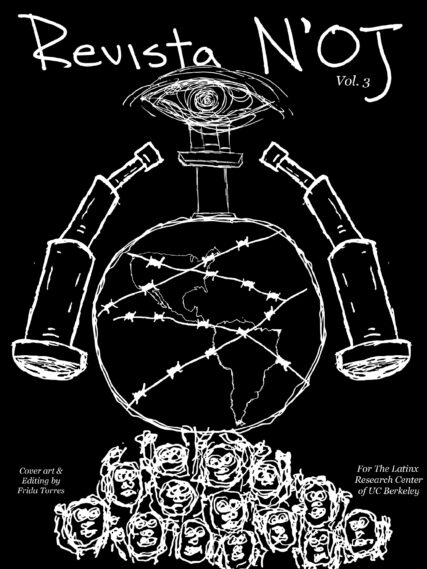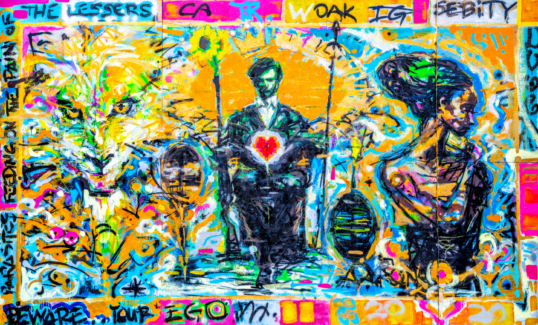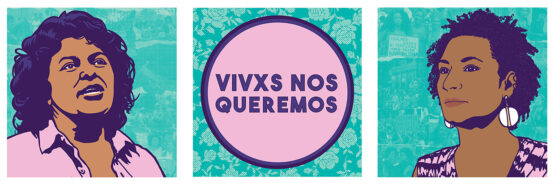
FOR THE LATINX RESEARCH CENTER, UNIVERSITY OF CALIFORNIA, BERKELEY

Spring 2023
Revista N’oj: The Body
The Fifth Issue of Revista N’oj focuses on the internal wisdom and knowledge of the body. Building off of the namesake of the revista, N’oj, a Mayan Kaqchikel word meaning “that which is not seen but exists” and refers to internal wisdom, this issue posits the body as knowledge and as resilience. The body not only holds wisdom but becomes a vessel of resistance as Latinx people survive, thrive, and maintain cultural practices that have long been at risk of erasure. In a colonial space, the body withstands violence and pain, but displays resilience and transformation. In this issue, we called upon Latinx people to reflect on these experiences through artistic mediums. We cultivated a space to allow community members to reflect on and represent their bodily experiences, whether that be intergenerational trauma, the pandemic, or the everyday.
Summer 2021
Revista N’oj: HYPHY
Heal Your People. Heal Yourself
The 4th issue of Revista N’oj is a collaboration between UC Berkeley Instructor and writer: Juan Berumen, Oakland community activist and poet Beto Ortiz-Silva, and UC Berkeley Chicanx Latinx Studies Program students as they reflect on what it means to heal themselves and our communities. Prof Berumen invited Beto to facilitate a creative writing workshop with his class in which he posited the acronym HYPHY: Heal Your People. Heal Yourself as a prompt for poetry. Originally, a unique 90’s Bay Area hip-hop, dance, and cultural movement, hyphy– short for hyperactive– referred to the chaotic release of energy from excitement, anger, and frustration. Beto’s reappropriation of the term as a writing prompt rethinks the relationship between culture, creative expression, and healing. The poems from issue 4 cover a range of themes from family healing, mental health, decolonization, joy, Indigenous heritage and invoke visions of collectivity and critical pathways of resistance.

Spring 2021
Revista N’oj: The Prison Industrial Complex and
Covid-19
The 3rd issue of Revista N’oj focuses on the conditions of the prison industrial complex (PIC) in the U.S. during the time of the COVID-19 pandemic. All submissions are first-hand perspectives from those personally affected by the PIC: both previously and currently. Critical Resistance defines the PIC as “a term we use to describe the overlapping interests of government and industry that use surveillance, policing, and imprisonment as solutions to economic, social and political problems.” Each contributor shares their personal experience through different mediums and names some of the systemic forces that make up the PIC. Some of the examples brought up by the contributors were the school to prison pipeline, hotspot policing, the militarization of police, and the mass incarceration of Black, Brown, and Indigenous persons.

FALL 2020
Revista N’oj:
Decolonizing Art and Praxis in the Time of Covid-19
Revista N’oj’s Issue #2 brings together articles, think pieces, research and poetry exploring the ways in which art can offer visions and proposals for working toward a world without racism, patriarchy, classism, etc. This issue was inspired by the long summer of 2020; a summer that was not only jolted by the rise of the Covid-19 pandemic but also roused by the community’s response to the murder of George Floyd. In response to the news of mass mobilization, Oakland businesses boarded up and reinforced windows and doors, turning the whole downtown into an empty labyrinth of wooden walls and hidden shops. In response, artist from throughout the Bay Area organized and assembled beautiful, creative, and inspiring murals turning Oakland’s downtown into a stimulating and picturesque open air museum. Issue #2 proposes to answer the question: How can art help us decolonize? In what ways can art help us analyze the present moment and how can it facilitate a decolonial future?

SPRING 2020
The inaugural issue of Revista N’oj: Homage and Legacy
This inaugural edition of Revista No’j is dedicated to paying homage to the radical traditions that have long served as beacons for our ethical, intellectual, social and political activism. The decolonial legacies gifted to us by our ancestors are always present in our efforts to create, imagine, and build an anti-capitalist, anti-racist, and inclusive future. The inaugural edition includes creative works on the legacy of social movements and radical thought in the Americas, along with essays on the political importance of the twLF and the persistent struggles against white supremacy at the intellectual (university) and political (the police, ICE, Border Patrol, etc.) levels.
Revista N’OJ ©2024 All right reserved.
